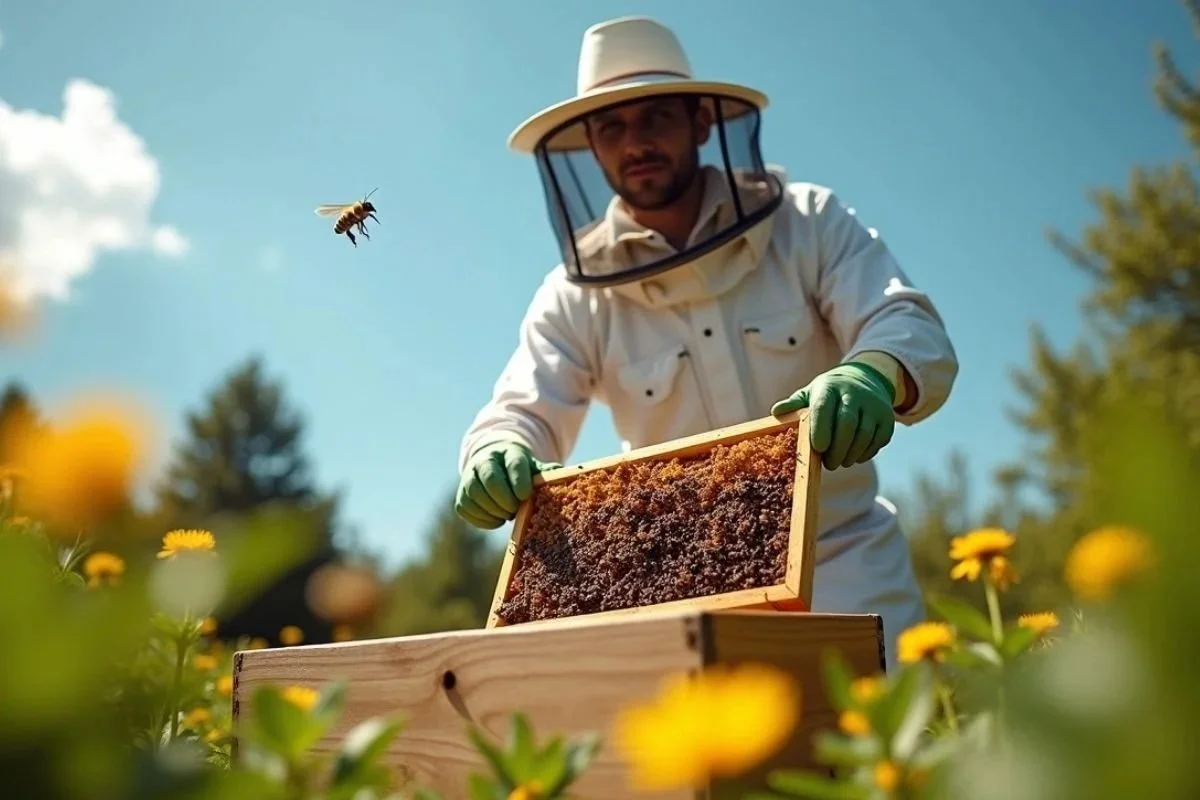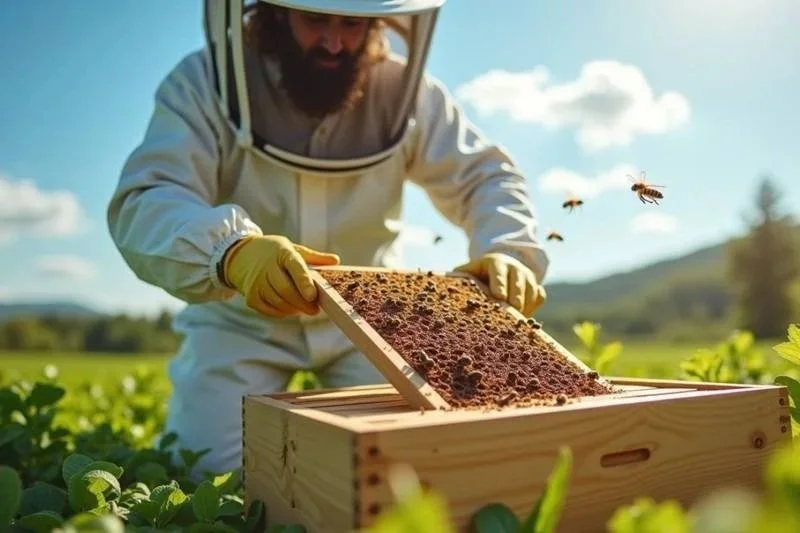How Relocated Bees Help Florida Farmers Grow Crops.
Bees are some of nature’s hardest-working pollinators, and in Florida, they play a vital role in growing the crops that feed our communities. Unfortunately, bees often build their hives in inconvenient places, such as on home walls, in attics, and in sheds. Instead of exterminating these essential pollinators, professional bee relocation services safely remove and relocate them to areas where they can thrive—often benefiting Florida farmers in the process. Relocated bees not only survive but also help boost pollination, leading to healthier crops, increased yields, and a stronger agricultural economy.
In this blog post, we’ll explore why bee relocation is important, how it works, and how Florida farmers benefit from this eco-friendly solution.
🐝 Why Bees Are Essential for Florida Agriculture.
Bee relocation in Florida supports farming and pollination.
Bees are responsible for pollinating approximately 75% of all fruits, vegetables, and nuts grown in Florida. Crops like blueberries, cucumbers, watermelon, squash, and citrus rely heavily on pollination. Without bees, these crops would have lower yields, smaller fruit sizes, and reduced quality.
Florida has a warm, subtropical climate that enables farmers to cultivate a diverse range of crops throughout the year. But this agricultural abundance comes with a challenge—there aren’t always enough bees in the wild to pollinate every farm efficiently. This is where relocated bees come in. Instead of being exterminated, these bees are placed in managed hives where they can pollinate crops and help farmers increase production naturally.
🌱 How Bee Relocation Works.
Bee relocation is a safe and humane alternative to killing bee colonies. Professional beekeepers and eco-friendly pest control companies use specialized tools and techniques to carefully remove bee colonies from unwanted areas. Here’s how the process typically works:
Hive Assessment – A trained beekeeper inspects the property to locate the hive and assess its size and condition.
Safe Removal – Using protective gear and equipment, the bees are gently vacuumed or brushed into transport boxes without harming them.
Hive Transfer – The bees and their queen are relocated to an apiary or farm where they can live safely.
Repopulation – Once relocated, the bees quickly adapt to their new environment and begin pollinating nearby crops.
This process not only saves the bees but also supports local agriculture. Instead of destroying valuable pollinators, relocation turns a potential nuisance into a resource.
🚜 The Connection Between Bee Relocation and Florida Farms.
Florida farmers rely heavily on managed pollination services to keep their crops healthy. When bees are relocated from homes or commercial properties, they are often introduced into these managed systems. This benefits farmers in several ways:
Increased Pollination Efficiency: Relocated bees supplement existing bee populations, ensuring every blossom is pollinated.
Reduced Costs: Farmers who rely on pollination services save money when more bees are available locally.
Sustainable Agriculture: By recycling bee populations through relocation, Florida agriculture becomes less dependent on importing bees from other states.
Stronger Ecosystems: Relocating bees helps maintain biodiversity, keeping Florida’s ecosystem balanced.
In short, every relocated hive represents thousands of bees that can now work alongside Florida farmers to produce food.
🌸 Pollination Benefits for Florida Crops
Relocated bees significantly impact crop production in Florida. Here are some examples of how pollination boosts agriculture:
Blueberries: Florida is one of the largest blueberry producers in the U.S. Bees are critical for pollinating blossoms, increasing both berry size and yield.
Citrus Groves: While citrus trees can self-pollinate, bee activity improves fruit set and overall quality.
Watermelon and Squash: These crops require extensive pollination. Without bees, farmers would struggle to achieve healthy yields.
Avocados: Pollination increases fruit size and uniformity, making the crop more profitable.
When bees are relocated, they are strategically placed near these crops, providing natural pollination without the need for harmful chemicals.
🌿 Eco-Friendly Pest Control and Bee Protection.
Traditional pest control methods often rely on pesticides and extermination, which can harm the environment and destroy pollinator populations. However, eco-friendly pest control services, like live bee removal, provide a sustainable alternative.
No Chemicals or Toxins: Relocation avoids pesticide use, protecting bees, soil health, and nearby wildlife.
Supporting Pollinator Conservation: Florida has experienced a decline in pollinators due to habitat loss, pesticides, and disease. Relocation helps reverse this trend.
Public Education: By relocating instead of killing bees, pest control professionals raise awareness about their importance.
This shift in mindset helps homeowners and farmers alike see bees as allies rather than pests.
🌾 How Farmers Benefit Financially
Relocated bees are not only a win for the environment but also for Florida’s farming economy. Pollination directly impacts farm revenue, and having a strong bee population saves money in several ways:
Higher Crop Yields: More pollination equals more produce per acre.
Better Quality Crops: Bees improve fruit size, shape, and shelf life.
Lower Costs for Pollination Services: Locally available bees reduce the need for expensive bee imports.
Stronger Farm Sustainability: Farmers can rely on local pollinator populations rather than fluctuating markets for rented hives.
By embracing relocated bees, Florida agriculture becomes more resilient and profitable.
🏡 Why Homeowners Should Choose Live Bee Removal.
Relocated bees pollinating a Florida crop field, helping farmers boost yields.
Many homeowners panic when they find bees nesting on their property, but calling an exterminator isn’t the best choice. By opting for live bee removal, homeowners:
Protect pollinators that are essential to Florida’s food supply.
Support local farmers by providing healthy bees for pollination.
Prevent unnecessary pesticide use around their property.
Help restore Florida’s declining bee populations.
Choosing relocation over extermination is a small action with a big impact.
🌍 Building a Pollinator-Friendly Future in Florida.
Florida’s economy depends heavily on agriculture, and agriculture depends on pollinators like bees. Relocating bees from homes, businesses, and urban areas into managed hives helps protect these vital creatures while boosting local food production.
When pest control professionals, farmers, and homeowners work together, they create a cycle that supports everyone:
Homeowners call eco-friendly pest control services for bee problems.
Bees are safely relocated instead of exterminated.
Relocated bees strengthen Florida’s pollination network.
Farmers grow healthier crops and provide more food.
The ecosystem thrives, benefiting wildlife and communities.
This approach demonstrates that protecting pollinators is not only good for the environment but also essential for Florida’s economy.
🐝 Final Thoughts
Relocated bees are more than just rescued insects—they are essential workers that keep Florida’s farms thriving. By choosing live bee removal services, property owners help protect pollinators, reduce pesticide use, and strengthen the agricultural supply chain. The next time you see a beehive near your home, consider calling a professional bee relocation expert. Together, we can save pollinators, support Florida farmers, and ensure a future where fresh produce continues to grow in abundance.


